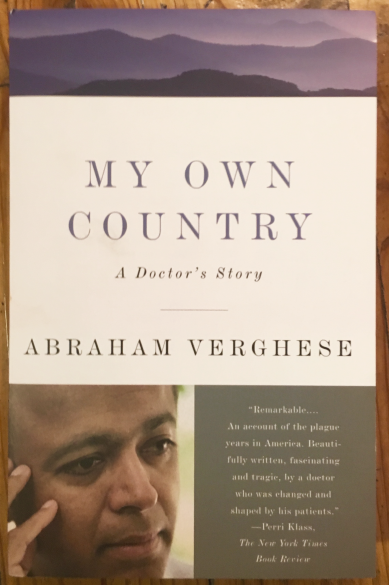Today we will review chapters 6-11 of “My Own Country: A Doctor’s Story” by Abraham Verghese.
Summary:
In this portion of “My Own Country,” Abraham Verghese begins to see an increase in the number of HIV clients in the area. With each new patient he meets, Verghese is very deliberate about getting to know them on a personal level, learning their stories, and the details of how they came to be infected. While he and the nurses on his service were caring and accepting of their new HIV patients, there were many physicians and nurses who were deeply uncomfortable providing care to this growing demographic. Their lack of acceptance seemed to strengthen Verghese’s resolve to provide the best, most comprehensive care possible.
As Verghese dedicated himself to his patients even more and developed closer relationships with them, he also began to realize the importance of community and feelings of belonging. The ability to advocate and educate people about HIV was fulfilling for both Verghese and many others who were infected or affected by AIDS. Not only that, but when people came together to learn and support one another, the feeling of being cared for and part of a group greatly influenced the way they responded to treatment and approached living with HIV.
Themes:
Community support; Acceptance; Doctor-patient relationships
Powerful Lines:
- Essie had no time to waste on worrying about the reaction of her neighbors. If there was shame in her brother having AIDS, in his being gay, she did not feel it. If anyone else felt it, it was irrelevant. (138)
- “You know,” she said, “my father still says he died of a stroke. Stroke, he understands; AIDS, he does not.” (151)
- “I don’t think we should have bothered in the first place.” Her voice was cold and the anger quite naked. “He deserved what he got. It’s no one’s fault but his. And I don’t see why we should have to take care of him.” There it was. Naked, ignorant and shameful prejudice that I had anticipated, had feared, but had thus far been spared, at least directly. (160)
- What I didn’t mention was how stressed I felt some days, how alienated I felt from other physicians, from friends, and even from my wife. By God, if what I was doing was noble, why did it feel like something…something shameful? (168)
- How many other men did we have in our town with time bombs ticking in them? How many others had returned home from elsewhere and were too scared to come to me or were still in denial? How many others did not even know they were infected? (181)
- Fred continued: “I can’t tell you how important TAP [Tri-City AIDS Project] has become for me. It’s made me feel that there are people interested in me.” (185)
Questions to Ponder:
- Verghese was very intentional about getting to know and understand each of his patients. What makes a patient comfortable with a doctor? How does that relationship affect their medical care and treatment?
- For Verghese, his work with HIV patients became all consuming; in fact, he was excited by the prospect of getting new HIV patients. Was driven by passion for his work and a sense of responsibility to care for those other doctors wouldn’t care for, or was it motivated more by the novelty of HIV and a fascination with this “other” lifestyle?
Challenge:
For some people, like Verghese and Carol, caring for people with HIV came easily and without hesitation, while many people, including family members and other medical professionals, were fearful and judgmental. Try to be aware of areas in your own life where a lack of understanding may be causing you to close people off. Instead, make an effort to learn their stories and find points where you might relate, allowing understanding and compassion to emerge.

